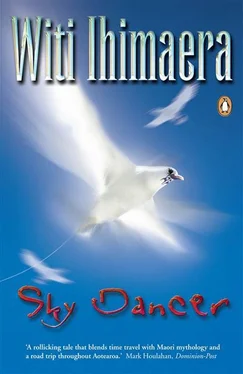Back at the inlet, Arnie heard the distant roar. “The battle’s begun,” he said. He had set up the shotgun on a rocky promontory overlooking the lagoon and drafted Chieftain Ruru and his owl iwi to lift the shotgun into position. There, he stabilised it on a base of rocks, with the double barrels firmly pointing down Manu Valley.
Meanwhile, Skylark was supervising the females in weaving small cradles and ropes for the pulley and winch system by which the shotgun could be fired.
“I can’t stay any longer,” Arnie said.
“You can’t?” Skylark began to panic. Now that the battle was imminent she was really scared. She didn’t want him to go.
Words failed them both. How do you say goodbye when you’ve gone beyond words? There was only one thing left to do — and Arnie did it. He swept Skylark up in his wings and gave her a hug. It was quite a shock.
“Get the shotgun loaded, and if the seabirds make it past our defences, pull the trigger at my signal. Okay?”
“Okay,” Skylark said, trying to recover.
“By the way, did I tell you that I discovered oil when we went on our reconnaissance last night?”
“Oil?”
“Right there between the offshore islands and where Tuapa will be built. The stuff is just oozing out of the ground. Goodbye, Skylark!”
Without thinking, Arnie pecked her on the cheek and took to the sky.
“So you’re just friends, right?” Kotuku teased.
Arnie’s ruse worked. As the shrilling increased, Karuhiruhi quailed and called a halt on the advancing army.
Kawanatanga flew forward to investigate.
“The landbirds offer strong resistance,” Karuhiruhi said.
“No, my ancestor,” Kawanatanga answered. He saw Karuhiruhi was jittery, nervous. “Do not do as hens do and take flight at the slightest noise of opposition.”
“You were not here for the first battle,” Karuhiruhi hissed, offended at the inference that he was a woman. “You know nothing of the landbird forces.”
While they were arguing, Arnie reached the front. He took his place with Chieftain Tui, Chieftain Kawau and Chieftain Kahu and scoped the situation. “We have the advantage of the wind,” he noted. “It’s coming down Manu Valley. The seabirds will have to beat into it. Are our first line of windhovers in position?”
“Yes,” Tui nodded.
“Then lets get down and dirty,” Arnie said.
With that, Tui stood and called to the manu whenua. “Ka mahi te mea i tohia ki te wai o Tu tawake. All honour to those who have been baptised in the waters of the war god. Tukua mai kia eke ki te paepae! Let the seabirds come to the threshold if they dare! Toi te kupu, toi te mana, toi te whenua! Fight for our right to sing, for our right to hold the land, for our right to our own prestige!”
Ever the showman, Tui let his voice roll out to the horizon, echo following echo. Once that was done, he ordered the battle to begin.
“Go forth, Chieftain Whiorangi of the silver eye clan,” he said. “Do your job. Divert the enemy —”
At the command, Whiorangi flitted across that lonely sky, a small speck disappearing into the maw of the seagull army.
Karuhiruhi laughed when he saw him. “What are you doing so far from the forest and over the sea?”
“I come to give you warning,” Whiorangi chirruped. “You lost the first battle. You will lose the second. Retreat or face the consequences.”
“Ka mahi te ringaringa aroarohaki taua,” Tui called. “The wing which quivers in the face of the enemy is to be admired.”
Karuhiruhi roared with laughter. “Get out of our way, you little sliver of silver, before you become a toothpick for my beak.”
“Oh, is that so?” Whiorangi answered. He folded his wings and dropped like a stone. Only then did Karuhiruhi see that the fork-tailed swift clan, the fastest-flying and most aerial of birds, was plummeting from the highest sky. Led by Chieftain Teretere, the first squad went in, blurred lightning, with wings long and scimitar-shaped. Large and powerful, they whistled down the wind like arrows unleashed from a thousand crossbows.
Karuhiruhi could scarcely believe it. “They come to us, Kawanatanga. Who gives them such bravado?”
“It is the falcon from the future,” Kawanatanga realised. “I have misjudged him, but I will not do it again. Front ranks, prepare to engage.”
The order was given just in time, for when the swifts closed with the enemy, they used their speed to scythe through the seabirds. Those in their way were speared where they flew. Those who were alert deflected their attackers. The first blood of the battle went to the landbirds.
The second squad was unleashed. This time Karuhiruhi had his wits about himself. “Let them through,” he commanded. As the swifts arrowed closer, the front lines of gulls, prions and terns opened up. “Now close and kill,” Karuhiruhi screamed.
Trapped in a circle of snapping, ripping beaks, the swift squad succumbed.
“Never mind your losses!” Chieftain Teretere yelled from the middle of the melee. “Press on, press on.”
Kawanatanga turned to look in Arnie’s direction. “Come on, my little chickadee,” he called, “show me the stuff you’re made of.”
Arnie gave the signal for the second contingent of windhovers to go forward.
“Chieftain Kahu, it’s your turn,” he said.
Kahu nodded and with a single flap of his powerful wings took to the sky. His hawk squadron followed him, using the thermals to gain cruise altitude. Aware of the danger, Karuhiruhi ordered Karoro’s battalion to pursue the hawks and form a buffer between them and the seabird army. As the battalion did so, Karoro realised with alarm that he was being blinded by the light. He cursed that his gulls were so vulnerable. “Watch for hawks coming out of the sun,” he cried.
Too late. Kahu levelled and screamed his harsh hunting cry to his warriors. “At my command, pick your own targets and dive, dive, dive —”
One by one, the hawks banked, closed their wings, approached attack velocity and struck with hooked bill and powerful grasping talons. Flying with the sun at their backs, they swept a bloodied swathe through Karoro’s blinded seagull troops. Many were the gulls who went to meet their Maker that day.
The battle was not all one way, however. Kahu let out a cry of sorrow when he saw that two of his favorite nephews had been engaged, lost the fight and were falling headless to the earth. To his left flank, another of his lieutenants was wounded, and fighting wing to wing against four opponents.
Then Toroa and his albatross squad came whistling down from the upper Heavens — and the hawks were fighting for their lives.
Watching from the forest, Chieftain Tui turned to Arnie. “We are outnumbered. The odds are against us,” he said.
“Send in all our birds,” Kawau yelled. “Throw everything at them.”
“Yes,” Chieftain Kaka added. “Let’s do or die.”
“No,” Arnie answered. “If we lose our control we will die. Hold to the battle plan. Should the manu moana breach the windhover defences, our second line of bellbirds, parakeets and pigeons will be waiting. And if they breach that, we will have the rails, robins, fantails and saddlebacks at the third. At every seabird advance, they will find our troops. If we have to, we will field a running battle all the way back to the inlet.” He gave the signal to Chieftain Parera of ducks: “Time for you to make your diversionary move.”
“Come on, boys,” Parera quacked. “Let’s do our thing.”
Large and goose-like, the paradise shelducks took wing like bomber squadrons. Quickly they closed on the seabird front. All the way across, however, the shelducks were complaining:
“Why can’t we continue on our flight path and engage the enemy? Do we really have to pretend to be afraid and break to the right, boss?”
Читать дальше












